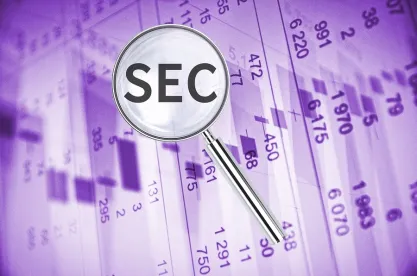Introduction
As has been widely reported, the application of Investors' Exchange, LLC (IEX) to register with the Securities and Exchange Commission (SEC) as a national securities exchange has generated unprecedented interest and a fair share of controversy. IEX came to public prominence as the result of its featured role in the 2014 Michael Lewis book Flash Boys. From the initial application to approval, the registration process took 10 months, required five application amendments by IEX, and generated nearly 450 comment letters. A primary point of contention among market participants arose from IEX's plan to impose an intentional "speed bump" that will delay incoming electronic messages to IEX (e.g., orders to buy or sell and modifications to previously sent open orders) and outbound messages from IEX (e.g., confirmations of executions) by 350 microseconds. IEX views the delay as a means to prevent high-frequency traders from taking advantage of other market participants, but opponents contend (among other things) that the delay will create stale prices and the opportunity for manipulation. On June 17, the SEC simultaneously approved IEX's application for registration[1] and issued an interpretation that effectively requires other trading centers to honor IEX quotes under the SEC's national market system rules, despite the delay imposed by the speed bump.[2]
Background: The Order Protection Rule and the SEC's Prior Interpretation
A trade-through occurs when a trading center executes an order at a price that is inferior to the price of a protected quotation displayed by another trading center. Rule 611 of Regulation NMS (the Order Protection Rule) establishes intermarket protection against trade-throughs for all NMS stocks by requiring trading centers to honor the best priced "automated quotations" of other trading centers[3] and not execute trades at inferior prices. Pursuant to Rule 600(b)(3) of Regulation NMS, an automated quotation is (among other requirements) one that can be executed immediately and automatically against an incoming immediate-or-cancel order. In the Regulation NMS adopting release, the SEC interpreted "immediate" in this context to "preclude[] any coding of automated systems or other type of intentional device that would delay the action taken with respect to a quotation."[4] As explained by the SEC, absent further interpretation, the IEX speed bump would fall within this interpretation because the speed bump is an intentional device designed to delay the action taken with respect to an IEX quotation.[5] Consequently, under this prior interpretation, IEX quotations would not be capable of being executed immediately for Rule 600(b)(3) purposes, would therefore not constitute "automated quotations" under Rule 611, and would not be protected by the Order Protection Rule. That is, the Order Protection Rule would not preclude other trading centers from trading through IEX quotations, even when the IEX quotations were at the best price.
The SEC's Updated Interpretation Requires Trading Centers To Honor Automated Quotations That Are Subject To Approved Intentional De Minimis Delays
In its new Interpretation, the SEC updated its previous interpretation of what constitutes an order that is capable of being executed immediately and automatically against an incoming immediate-or-cancel order under Rule 600(b)(3) of Regulation NMS. The SEC noted that small unintentional delays in accessing protected quotations are inherent in the markets and that such unintentional delays were commonly accepted as consistent with the "immediate" standard under Rule 600(b)(3).[6] Accordingly, the SEC determined that a small intentional delay similarly would be consistent with the "immediate" standard and would not prevent investors from accessing stock prices in a fair and efficient manner consistent with the goals of the Order Protection Rule. Therefore, the SEC concluded that the term "immediate" under Rule 600(b)(3) only precludes coding of automated systems or other types of intentional action that would delay access to a security price beyond a de minimis amount of time.[7] In other words, a quotation may constitute an automated quotation (i.e., one that can be executed immediately) and thereby be subject to protection under the Order Protection Rule, even if the trading center in question intentionally imposes a small (i.e., de minimis) delay or "speed bump" with respect to accessing the quotation. The SEC explained that an intentional delay so short that it does not impair fair and efficient access to an exchange's protected quotations would be considered de minimis for these purposes.[8]
While the SEC stated in the Interpretation that it was not adopting any particular threshold as the maximum permissible intentional delay that would constitute a "de minimis" delay for purposes of the Interpretation, on the same day (June 17) the SEC staff (Staff) did publish guidance on that very issue.[9] The Staff guidance states that they believe intentional delays of less than one millisecond are de minimis delays for purposes of the Interpretation. The Staff explained that "a one millisecond intentional access delay is well within the current geographic and technological latencies already experienced by market participants when routing orders between trading centers." Therefore, the Staff concluded that such a delay would not impair fair and efficient access to a quotation and would be de minimis and consistent with the SEC's new Interpretation of "immediate" as used in Rule 600(b)(3).
As a consequence of the foregoing, the intentional 350 microsecond delay imposed by IEX will be considered to be a de minimis delay such that IEX quotes will constitute "automated quotations" under Rule 600(b)(3) and will be subject to the protections of the Order Protection Rule. As such, other trading centers will be required to honor IEX quotations that constitute best price.
Finally, the SEC made clear that the updated Interpretation does not give exchanges free reign to unilaterally impose access delays: "[T]his interpretation does not obviate the requirement of individualized review of proposed access delays, including de minimis delays, for consistency with the Exchange Act and Regulation NMS. Any exchange seeking to impose an access delay must reflect that in its rules, which are required to be filed with the Commission as part of the exchange application or as an individual proposed rule change. . . . Any proposed application of an access delay would therefore be subject to notice, comment, and the Commission's separate evaluation of the proposed rule change."[10]
[1] Securities Exchange Act Release No. 78101 (June 17, 2016), 81 FR 41142 (June 23, 2016). IEX's operation as a national securities exchange is conditioned upon it satisfying various requirements set forth by the SEC. Id. at 41165-66.
[2] Securities Exchange Act Release No. 78102 (June 17, 2016), 81 FR 40785 (June 23, 2016) (the "Interpretation").
[3] Only an exchange that constitutes an "automated trading center" (as defined by Rule 600(b)(4) of Regulation NMS) is entitled to this protection.
[4] See Securities Exchange Act Release No. 51808 (June 9, 2005), 70 FR 37496, 37534 (June 29, 2005). In reaching this conclusion, the SEC accepted that the "immediate" standard would accommodate small, immaterial unintentional delays. See id. at 37519.
[5] See Interpretation, supra note 2, at 40787, n.26.
[6] See id. at 40789. The SEC noted that small unintentional delays do not prevent fair and efficient access to prices, stating: "Systems processing and transit times, whether at the exchange, the market participant sending the order, or its agent, all create latencies in accessing protected quotations. Even the most technologically advanced market participants today encounter delays in accessing protected quotations of 'away' automated trading centers that either are transitory (e.g., as a result of message queuing) or permanent (e.g., as a result of physical distance). Furthermore . . . any market participant co-located with the major exchanges' data centers in northern New Jersey necessarily encounters delays of 3-4 milliseconds—due to geography alone—in accessing the protected quotations of securities traded on the Chicago Stock Exchange's matching engine in Chicago. No commenter asserted that the periodic message queuing or minor systems-processing delays encountered at exchanges with protected quotations, or the time it takes to access the protected quotes of the Chicago Stock Exchange's Chicago facility, would, for example, materially undermine market quality or price transparency." Id.
[7] Id.
[8] Id. at 40786.
[9] Staff Guidance on Automated Quotations under Regulation NMS (June 17, 2016) (available here).
[10] See Interpretation, supra note 2, at 40790. The SEC also noted that within two years of its updated interpretation, SEC Staff will conduct a study regarding the effects of any intentional access delays on market quality and will provide the SEC with recommendations based on such report. Id. at 40793.




 />i
/>i
